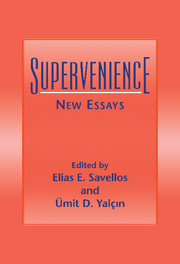Book contents
- Frontmatter
- Contents
- List of Contributors
- Introduction
- Varieties of Supervenience
- Supervenience: Model Theory of Metaphysics?
- “Global” Supervenient Determination: Too Permissive?
- Weak Supervenience Supervenes
- The Tweedledum and Tweedledee of Supervenience
- Reduction in the Mind of God
- Psychophysical Supervenience, Dependency, and Reduction
- Supervenience Redux
- Nonreducible Supervenient Causation
- Physicalism, Supervenience, and Dependence
- An Argument for Strong Supervenience
- Arguments for Supervenience and Physical Realization
- Supervenience and the Essences of Events
- How Does Ontology Supervene on What There Is?
- Supervenience and Intentionality
- Supervenience, Coherence, and Trustworthiness
- Does Truth Supervene on Evidence?
- Index
Psychophysical Supervenience, Dependency, and Reduction
Published online by Cambridge University Press: 29 March 2010
- Frontmatter
- Contents
- List of Contributors
- Introduction
- Varieties of Supervenience
- Supervenience: Model Theory of Metaphysics?
- “Global” Supervenient Determination: Too Permissive?
- Weak Supervenience Supervenes
- The Tweedledum and Tweedledee of Supervenience
- Reduction in the Mind of God
- Psychophysical Supervenience, Dependency, and Reduction
- Supervenience Redux
- Nonreducible Supervenient Causation
- Physicalism, Supervenience, and Dependence
- An Argument for Strong Supervenience
- Arguments for Supervenience and Physical Realization
- Supervenience and the Essences of Events
- How Does Ontology Supervene on What There Is?
- Supervenience and Intentionality
- Supervenience, Coherence, and Trustworthiness
- Does Truth Supervene on Evidence?
- Index
Summary
A familiar strategy for nonreductive physicalists of mind to employ in their attempt to reconcile psychophysical event identity with the view that mental and physical properties of events are irreducibly distinct is to appeal to some version of the doctrine of psychophysical supervenience. Many who appeal to this doctrine do so in the belief that psychophysical supervenience not only establishes a covariance relation between mental and physical properties, in the sense that indiscernibility with regard to the latter entails indiscernibility with regard to the former, but establishes an asymmetric relation of dependency of mental upon physical properties that falls short of reducibility. Psychophysical supervenience is thus thought to be capable of showing that although mental properties are strictly speaking nonphysical, the ontology of the physical world in some sense both determines and exhausts what there is to the mental domain. I think it fair to say that many nonreductive physicalists of mind, myself included, believe that without supplementation by some version of a supervenience thesis, nonreductive monism is not worthy of the name ‘physicalism’.
Recent discussions of psychophysical supervenience have focused primarily on different conceptions of supervenience (strong, weak, global), on the question of which conceptions (if any) are appropriate to the psychophysical case, and on the question of whether those conceptions that may be appropriate to the psychophysical case lead to reducibility. The difficulty faced by nonreductive physicalists is to find a characterization of supervenience that is strong enough to meet the demands of asymmetric dependency without also leading to reducibility.
- Type
- Chapter
- Information
- SupervenienceNew Essays, pp. 140 - 157Publisher: Cambridge University PressPrint publication year: 1995
- 1
- Cited by



